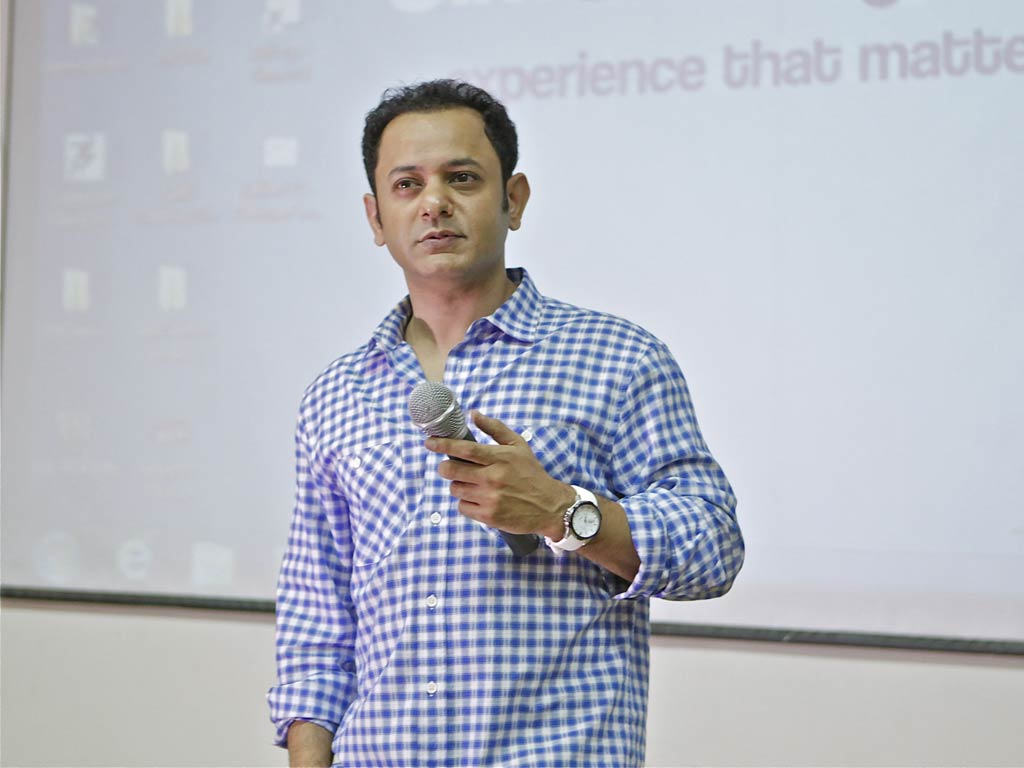1. How do you break into the feature film industry, if you’re a film student?
To begin with, I recommend maintaining a steady income or availing financial support to keep you going before you indulge in this direction, then stay committed to execution without external pressure. Once you’re at that stage in life where you can sustain yourself without succumbing to the ‘Starving Artist’ syndrome many of us suffer, that’s when I would advise you to just make films! There are no short cuts.
Simultaneously, a short-filmmaking workshop could kick-start the spark. Education itself does not play as important a role as the feature film projects you direct and their result, so just make a film and another and another… Enjoy and indulge in the process of transporting thoughts to screen.
2. Can you define for us, in three words, what you look for in any film?
Intent-Relatability-Sensibility
3. Give us an insight into your ideation process for scripts.
My films, Life! Camera Action… (LCA) and Another Day Another Life (ADAL), rather chose me. ADAL was a ready to-go script, which went in to production almost immediately so there wasn’t any of my personal ideation process involved, I’d say. LCA, on the other hand, which started as a short-film and as per the demands of the story was expanded to a feature, does have some personal ideation involved but it isn’t to a great extent since the original script itself has the crux of the plot. I just took that and created a support system, which included the main plot and backstory, around it in close collaboration with Amanda Sodhi, who is the writer of the original short script. The process was kind of interesting. I would type out my thoughts and send it to her to which she would add hers in a structured screenplay format making the production process easier.
Given that I had just come out of an intense and emotionally exhaustive creative process while putting together Life! Camera Action… a message driven drama-film, I wasn’t ready to go through another emotional roller coaster subject for a while so came about Midnight Delight, a comedy feature with no glaring message whatsoever, at least that’s what we’d like to believe is the result. The ideation process for MD was primarily based on available resources. I first decided what resources I have available at hand and simultaneously set the story within that environment.
A NYC based writer originally sent our next feature script. The simplicity of the story and production elements seemed just right so began our collaboration. I feel that the idea is never fully developed until the last phase of the making process.

4. How do you direct actors without teaching them how to act?
First I try to cast actors with emotional experiences, cultural backgrounds and a life understanding similar or at least as close as possible to the story line and their would-be character on screen. Then I take time with each of them to explain in detail about the overall creative process and overall vision. This in itself creates an environment of freedom, builds a sense of solid bonding and trust. Once this happens, I leave them free and so the exploration begins. The result is invariably magical!
5. From a technical standpoint, what do you find most difficult about the profession?
There aren’t as many challenges to put a film together as much as there are to hustle through the marketing & distribution process.
6. What advice would you have for aspiring candidates in the field?
Work as collaborators not competitors, with everyone you liaise with. Please treat people with love and respect as once the project is completed, it’s the people that stay, not the project. Collaborate with people who know more than you. Trust and respect their experience and then leave them free to do what they enjoy and love doing. The results may amaze you and that’s what matters the most – Amaze ourselves. Asking for advice from those who never made a feature film is a great way of finding reasons for not doing it. Learn from and collaborate with those who’ve objectively achieved a milestone and/or a level of success that you can relate to. There is nothing like being original. Some worry too much about the audience’s reception of the project–to the point that it affects the process of creating the final image. The audience won’t know what they like “until they see it.” Some worry too much about audience expectations that there is a choke hold on creativity and productivity. Many say their biggest hurdle is the lack of resources but with technology at our fingertip, everyone is able to do what they want. Stay committed to execution without any pressure.
Unless you do this, you won’t know what you like about what you do and why. The final image is the result of what has been put in its process. The same will be seen in its result and so will your audience connect. It’s a teamwork, focus on things under your control – the process – which at times is also beyond your control. There will always be a difference between what you imagined and the result No one knows the result would be so why not enjoy what we can now and under our control. This is the definition of success. The audience, I believe, won’t know what they like “until they see it.” Some worry too much about audience expectations that there is a choke hold on creativity and productivity.
If you try to make everybody happy, you will lose yourself. In the end, if you are happy, then everybody around feels the energy and, in turn, feels happy, too. It’s just like doing everything else. Just remind yourself movie making is over-hyped and just like everything in life there are no short cuts and no mantra to it!










